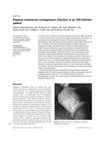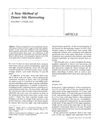 15 citations,
March 2000 in “Dermatologic Surgery”
15 citations,
March 2000 in “Dermatologic Surgery” Hair transplantation has evolved since 1822, with significant advancements by key figures and widespread international growth.
 14 citations,
June 2016 in “Pediatric Dermatology”
14 citations,
June 2016 in “Pediatric Dermatology” Some congenital hair disorders improve with age and can be managed with treatments like minoxidil, retinoids, supplements, and gentle hair care, but there's no cure.
[object Object]  14 citations,
May 2011 in “Drug Metabolism and Disposition”
14 citations,
May 2011 in “Drug Metabolism and Disposition” Ketoconazole increases finasteride's effectiveness and lifespan in the body.
 14 citations,
December 2010 in “Seminars in Oncology”
14 citations,
December 2010 in “Seminars in Oncology” Rare adrenal cancers that secrete androgens or estrogens have a poor prognosis and are treated primarily with surgery.
 13 citations,
May 2019 in “Cancer Prevention Research”
13 citations,
May 2019 in “Cancer Prevention Research” Grape seed extract may safely and effectively help prevent lung cancer.
 13 citations,
January 2017 in “Chemical & Pharmaceutical Bulletin”
13 citations,
January 2017 in “Chemical & Pharmaceutical Bulletin” Certain compounds, especially those with a propionic substituent, could potentially be new treatments for hair loss and similar disorders.
 11 citations,
June 2017 in “Journal of cell science”
11 citations,
June 2017 in “Journal of cell science” AGD1's PH domain is essential for its role in root hair growth and polarity.
 11 citations,
January 2011 in “Turkish Journal of Medical Sciences”
11 citations,
January 2011 in “Turkish Journal of Medical Sciences” Low iron levels are a significant risk factor for hair loss, while high vitamin D levels might be a response to hair loss, not a cause.
 11 citations,
June 2005 in “Stem Cells and Development”
11 citations,
June 2005 in “Stem Cells and Development” Intestinal stem cells can help repair skin damage from radiation.
 11 citations,
May 1998 in “International Journal of Dermatology”
11 citations,
May 1998 in “International Journal of Dermatology” Using a blow dryer in a certain way can cause localized hair damage with bubble formation inside the hair.
 10 citations,
December 2017 in “Chemosphere”
10 citations,
December 2017 in “Chemosphere” Bisphenol-A (BPA) increases connections between brain cells and boosts their activity, but it blocks the effects of a male hormone on brain cell plasticity.
 10 citations,
January 2016 in “Dermatologic Clinics”
10 citations,
January 2016 in “Dermatologic Clinics” Some acne medications have side effects; doctors should educate patients and may not need to do frequent lab tests for all.
 10 citations,
December 2015 in “Clinics in Dermatology”
10 citations,
December 2015 in “Clinics in Dermatology” Diabetes can lead to blindness and skin problems, and managing blood sugar and blood pressure is crucial to prevent these complications.
 10 citations,
January 2012 in “Lupus”
10 citations,
January 2012 in “Lupus” NEMO syndrome and systemic lupus erythematosus are linked in a new disease association.
 10 citations,
May 2010 in “Analytica Chimica Acta”
10 citations,
May 2010 in “Analytica Chimica Acta” New tests detect finasteride and dutasteride in urine quickly and easily.
 9 citations,
April 2021 in “Expert opinion on pharmacotherapy”
9 citations,
April 2021 in “Expert opinion on pharmacotherapy” Clascoterone is a new, effective, and safe acne treatment without systemic side effects.
 8 citations,
July 2018 in “Analytical sciences”
8 citations,
July 2018 in “Analytical sciences” Using 5-butylpicolinate esters improves the sensitivity and reliability of detecting testosterone and dihydrotestosterone in saliva.
 8 citations,
February 2014 in “Stem cells translational medicine”
8 citations,
February 2014 in “Stem cells translational medicine” Modified stem cells that overexpress a specific protein can improve hair growth and reduce hair abnormalities in mice.
 8 citations,
July 2012 in “Annals of biomedical engineering”
8 citations,
July 2012 in “Annals of biomedical engineering” Hair absorbs molecules differently based on their size, charge, and love for water, and less at higher pH; this can help make better hair products.
[object Object]  8 citations,
July 1984 in “The Journal of Dermatologic Surgery and Oncology”
8 citations,
July 1984 in “The Journal of Dermatologic Surgery and Oncology” A new suturing technique for hair transplant donor sites leads to better scarring and allows more grafts to be taken.
 7 citations,
March 2021 in “Biology”
7 citations,
March 2021 in “Biology” Scaffold improves hair growth potential.
 7 citations,
December 2019 in “American Journal of Clinical Dermatology”
7 citations,
December 2019 in “American Journal of Clinical Dermatology” Topical therapies show promise for hair loss and acne treatment with minimal side effects.
 7 citations,
November 2013 in “Pediatrics in Review”
7 citations,
November 2013 in “Pediatrics in Review” Acne is a chronic skin condition not caused by poor hygiene or diet, and it requires long-term treatment and patient education.
 6 citations,
April 2020 in “Applied sciences”
6 citations,
April 2020 in “Applied sciences” Hair growth medium helps heal wounds and regrow hair in mice.
 6 citations,
October 2018 in “Endocrinology”
6 citations,
October 2018 in “Endocrinology” Prenatally androgenized ewes can model increased hair diameter in women with PCOS.
 6 citations,
July 2018 in “Scientific Reports”
6 citations,
July 2018 in “Scientific Reports” Methamphetamine affects gene expression in rat whisker follicles, with key genes linked to addiction.
 6 citations,
April 2012 in “Lasers in surgery and medicine”
6 citations,
April 2012 in “Lasers in surgery and medicine” Laser hair removal can cause a severe itchy rash in some allergic individuals, treatable with steroids.
 6 citations,
December 2011 in “Drug Research”
6 citations,
December 2011 in “Drug Research” Finasteride's two formulations absorb similarly, showing bioequivalence.
 6 citations,
August 2009 in “Mini-reviews in Medicinal Chemistry”
6 citations,
August 2009 in “Mini-reviews in Medicinal Chemistry” Different drugs can treat high male hormone levels in women, but they have various effects and some may harm a fetus.
 5 citations,
February 2018 in “Military medicine”
5 citations,
February 2018 in “Military medicine” A U.S. Naval fighter pilot suffered permanent vision loss in one eye due to recurrent central serous retinopathy.






























